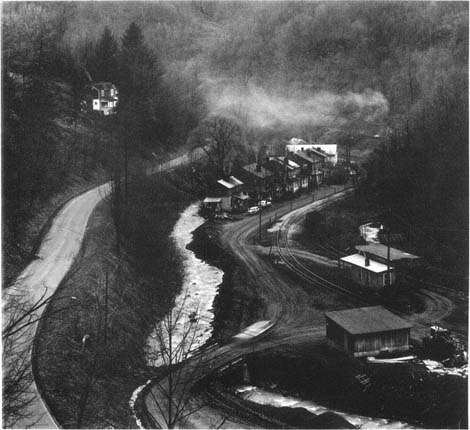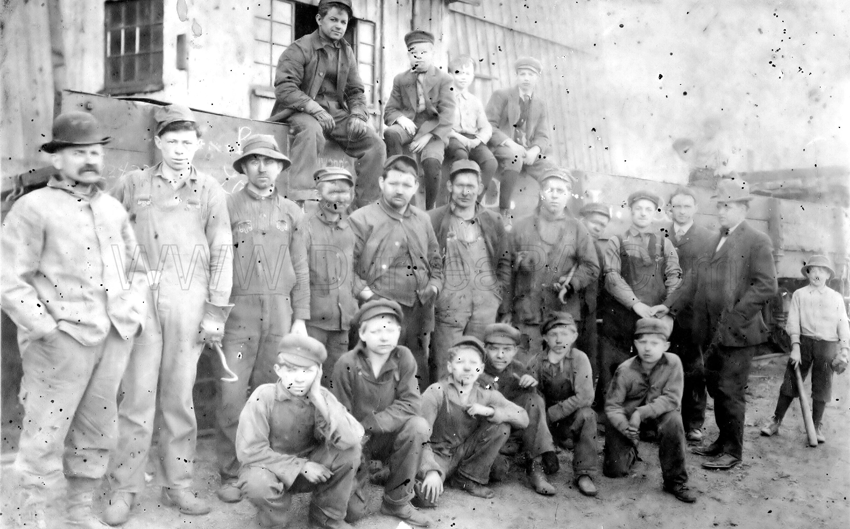| Home Page | Setting | Characters | Plot Twists | Utilities |
Bendix Falls: Setting
In the late 1800's and well into the mid-1900, many Appalachian miners lived in company towns called coal camps. Often there was no alternative to company housing because land for miles around was owned by coal companies. Thus, a large percentage of the coal miner's wages was returned to the coal company for housing, tools, food and other expenses. Typical mining camps were located in lower slopes, between two high ridges. These locations created a confined, crowded look. The homes nearest the tipple, the structure where the coal was brought to from the mine, received daily showers of coal dust which turned everything gray. The largest house in town was the Superintendent's house. Middle management, people who had jobs such as company store manager or foreman, had houses that were smaller than the Superintendent's, but still fairly nice. These were the houses that made up "Boss's Row." The other rows of houses, indicated by letters of the alphabet were the smallest houses in town. These were the coal camp houses rented by the miners and their families. The most common type of housing for the miner's family was the "Jenny Lind" style house. This was a one-story, box-like house built on a post foundation. The three or four rooms in the house were heated by a pot-bellied stove in the center of the house and fired with company coal. Many miners took in boarders to help pay the rent. Most miners had electric lights hung from the ceiling in the center of the room, but few homes had running water. Outside privies were the standard means of sewage disposal. Community life centered around the company store, which was usually located in the center of town. A barber shop, post office and company business offices were often housed in the same building with the store. Merchandise from food to home furnishings could be purchased on credit, using company scrip. Scrip was coins or paper printed by the company. It would only be good in the company store or for services provided by the company, such as the company doctor. Company stores consistently charged higher prices than stores outside of the coal company. As result, it wasn't long before most miners were in debt to company. The companies often employed mine guards to keep watch over the coal miners. Mine guards and miners often had violent encounters. Another important place in the coal camp community was the baseball diamond. Games were played on Sundays, which was the only day in the week that the coal miners didn't work. Teams from one coal camp would often travel to play another and there were even some miners employed by the company just so they could play baseball for the coal camp team. Major league teams, such as the Cincinnati Reds or Chicago Cubs, even traveled to the coal fields to play coal camp teams. There is a story, which may or may not be true, about these games. A big league team was traveling by train to West Virginia and one of the players asked the manager who they were going to play. The manager responded, "Oh, just a miner league team." He meant coal miners, of course. But, tradition has it that was how the terms major league and minor league came to be. Here are the memories of a man who was in the 4th grade in 1926: My responsibilities included getting up at 6:00, helping build fires and carrying in coal and water for the day. There were no buses, so I walked 1 to 3 miles a day to school, which started at 9:00 and was out at 4:00. We had no ball games, no movies, no nonsense. Class opened with the Lord's Prayer, Pledge of Allegiance and inspection of hands, face, neck, ears and a clean handkerchief. There were switches in the corner and a dunce stool in another; both were used when needed. If I got into trouble at school, I had more of the same when I got home. School lunches were not available. Students either went home for lunch or took something with them. My favorites were apple butter on a biscuit or soup beans and cornbread. The boys wore bib overalls, blue denim shirts and brogan shoes. Our pastimes were rolling an automobile tire, shooting marbles and rolling a whirl hoop. Each evening we carried in coal, kindling wood and water for the next day. Then we took a bath in a # 2 wash tub behind the cook stove. Buford Hartsog, MacArthur, WV  |